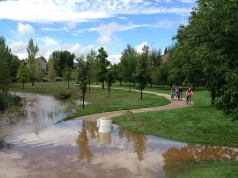A recent hearing related to the bungled Broomfield election made it clear that some public officials — even judges — still just don’t get it when it comes to coughing up open records.
Election reform activist Marilyn Marks, who has exposed many untoward practices — like using ballots that can be traced back to individual voters — got dragged into court by Broomfield officials after she had the gall to ask for public election records, including voted ballots.
Since it’s costly to hire an attorney for such proceedings, it’s a pretty effective form of intimidating citizens who are a bit too inquisitive, and it was enough to scare off Marks’ colleague Mary Eberle, who dropped her records request when notified that she’d have to go to court. Marks represented herself at the Jan. 6 hearing.
City and County of Broomfield Attorney Bill Tuthill and Clerk and Recorder Jim Candelarie offered some lame justifications for their claim that releasing the records would cause “substantial injury to the public interest.” They told District Court Judge Francis Wasserman they were concerned that opening the files might compromise two ongoing legal actions related to the election (including Wasserman’s own de-certification of the election results) and that a few ballots could be traced back to individual voters because of how ballots had to be sorted due to conflicting residency requirements.
Candelarie said he really wants to be transparent, deep down, but he was using an “abundance of caution” and didn’t want to “cause a problem” with the other cases.
Um, last time we checked, those weren’t legal justifications for withholding public records.
The Broomfield officials also argued that the judge hadn’t even made it clear yet whether the recount is complete, and the Colorado Open Records Act has differing standards on what can be released during and after an election.
Granted, the latter is a question that Wasserman should answer — and quickly. But as for the other excuses offered by Tuthill and Candelarie, there are ways to protect voter anonymity while still letting the public examine ballot materials, to ensure transparency. Wasserman offered a snarky suggestion regarding advances in technology that provide the ability to redact sensitive information: “Copy machines are wonderful these days,” he told Tuthill.
Marks rightly pointed out that just because a city or county is in the middle of litigation doesn’t automatically give it the right to withhold related open records. She also argued correctly that there shouldn’t be “blackout periods” on the ability of the public — or at least bipartisan election “watchers” — to inspect election materials.
“There can’t be any break in public oversight,” Marks said.
Deputy Secretary of State Suzanne Staiert, who has handled thousands of records requests and who testified at the hearing at Marks’ request, agreed.
“The voted ballots need to be available to someone,” she said.
Staiert said tends to “favor on the side of release when it comes to voted ballots” and that voter anonymity can be protected through redaction or by shuffling ballots into larger batches.
But aside from the bumbling justifications produced by Tuthill and Candelarie, perhaps one of the most telling — and disheartening — examples of public officials’ basic misunderstanding and distrust of open records requests came when the judge himself suggested that if Marks were given access to an election report she might claim it was tampered with. Gasp!
Her reply was perfect: “I would think that would be a proper role for a citizen, if they thought it had been tampered with.”
After all, your honor, the whole point of open government is to let the public see that it’s being done right — and, more importantly, when it’s not.
Respond: [email protected]













